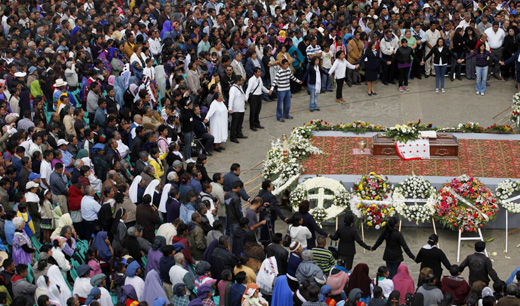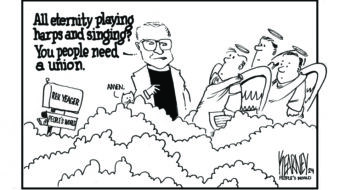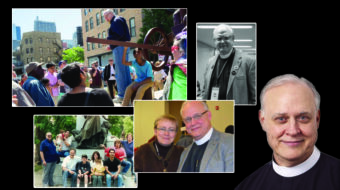
Two heavy blows in one week and a day! First, journalist, poet, commentator, lifelong post-beat Beatnik and activist for hopeless causes Johnny Ross, 72, died of liver cancer on the shores of Lake Patzcuaro in western Mexico, on January 17.
Then the following Monday, January 24, we lost Bishop Samuel Ruiz at age 86, of multiple natural causes. He was the Bishop of the impoverished indigenous people in Mexico’s southernmost state of Chiapas, the Bishop who had defended his parishioners against the powerful of both church and state, antagonizing the government and the Vatican to almost equal degrees.
John Ross was originally a denizen of New York’s Greenwich Village, a son of left-wing parents. He grew up in the beat poetry and art scene. During the Vietnam War, he was jailed for resisting the draft. Having traveled to Mexico in the 1950s and liking what he saw, he lived there on and off for the rest of his life, especially during his last 25 years.
But his interests were humanity-wide. In 2003 he went to Iraq to be part of a group of “human shields” protesting the impending U.S. attack on that country. He dealt with the Iraq theme in “Iraqi Girl: Diary of a Teenage Girl in Iraq”, now an e-book.
Ross was one of the most entertaining and well-informed writers on the Mexican political scene. He documented the 1985 Mexico City earthquake’s aftermath, the Zapatista uprising of 1994 and many other events, always from the point of view of the ordinary people, the workers and farmers. Yet he had managed to build firsthand contacts among the movers and shakers.
He was never afraid to lampoon anybody he thought deserved it, but was so charming about it that people put up with him, and somehow he never got thrown out of Mexico in spite of that country’s strict laws against foreigners meddling in politics.
The reader can get a taste of his style in his social history of Mexico City “El Monstruo: Dread and Redemption in Mexico City” published in 2009 by Nation Books. The book contains a few errors of fact, but it is right on the main points and extremely funny. Getting his crazy stuff in my e-mail in box will be sorely missed.
Bishop Samuel Ruiz was born in Irapuato in the ultra-Catholic state of Guanajuato in Central Mexico, at a time when the “Cristero” movement was fighting gun-in-hand against the militantly secularist policies of the Mexican state.
In 1960, he became Bishop of San Cristobal de las Casas in Mexico’s southernmost and most “indigenous” state, Chiapas.
The city is named for brother Bartolome de las Casas, a 16th century Spanish priest famous for his denunciations of the mistreatment of Latin America’s native people by the Spanish conquistadores. Gradually Samuel Ruiz began to adopt the same stance as defender of the indigenous poor against exploitative non-indigenous landowners and abusive political bosses. He also became a promoter of the use of native languages and symbols within the Catholic Church, and trained of thousands of lay catechists to work in Tzotzil, Tzeltal, Tojolabal and other indigenous language communities.
During the 1960s and 1970s, inspired by the liberalizing influences of Pope John XXIII and the Second Vatican Council, a mostly Catholic left-trending movement called “Liberation Theology” flourished in Nicaragua, Brazil and other places, before the lid was clamped down by Pope John Paul II.
Central American activists used to kid me by asking me how I could be a good Marxist if I was not a Catholic, so strong was that tendency. But it was never very strong in Mexico, so church support for Ruiz was limited.
Though Bishop Ruiz had a mild and unassuming mien, he was absolutely fearless in backing up his progressive theology with action. When the Zapatista rebellion broke out on January 1 1994, as a protest against the anticipated impact of NAFTA (which came in force that day), Bishop Ruiz was among the key figures in Mexico who took a public and physical stand to stay the hand of state repression.
Ruiz became the natural mediator between the Zapatistas and the government, playing a key role in the 1995 accords (never fully implemented) of San Andres Larrainzar, Chiapas, designed to end the conflict.
Because of his defense of the indigenous poor, Ruiz was hated by local landowners and local and national political bosses as well as important people in the church. He was threatened and shot at. In 2000, he was finally forced to retire.
Neither church nor state could silence Johnny Ross and Samuel Ruiz, but time eventually stops all our mouths. The seeds they sowed continue to germinate in lush profusion.
Photo: Crowd of mourners surround the coffin of Bishop Samuel Ruiz at funeral service in San Cristobal de las Casas, Mexico, Jan. 26. (Eduardo Verdugo/AP)

MOST POPULAR TODAY

High Court essentially bans demonstrations, freedom of assembly in Deep South

U.S. imperialism’s ‘ironclad’ support for Israel increases fascist danger at home

Zionist organizations leading campaign to stop ceasefire resolutions in D.C. area

UN warns that Israel is still blocking humanitarian aid to Gaza

Resource wars rage in eastern Congo, but U.S. capitalism only sees investment opportunity






Comments